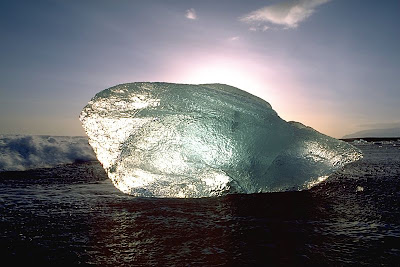Water has some unusual properties. It's less dense at zero degrees celsius than it is at four degrees celsius. This is because when water freezes the molecules become fixed in a crystalline lattice, and each molecule is pushed away from its neighbours. If this wasn't the case, ice would sink instead of float and seas and lakes would freeze solid.
Liquid News
Characteristics
An unusual feature of ice frozen at a pressure of one atmosphere is that the solid is some 8% less dense than liquid water. Water is also one of the few substances to expand when it freezes.
Ice has a density of 0.917 g/cm³ at 0 °C, whereas water has a density of 0.9998 g/cm³ at the same temperature. Liquid water is most dense, essentially 1.00 g/cm³, at 4 °C and becomes less dense as the water molecules begin to form the hexagonal crystals of ice as the temperature drops to 0 °C. (the word "crystal" derives from Greek word for frost.) This is due to hydrogen bonds forming between the water molecules, which line up molecules less efficiently (in terms of volume) when water is frozen. The result of this is that ice floats on liquid water, an important factor in Earth's climate. Density of ice increases slightly with decreasing temperature (density of ice at −180 °C (93 K) is 0.9340 g/cm³).
When ice melts, it absorbs as much heat energy (the heat of fusion) as it would take to heat an equivalent mass of water by 80 °C, while its temperature remains a constant 0 °C.













No comments:
Post a Comment